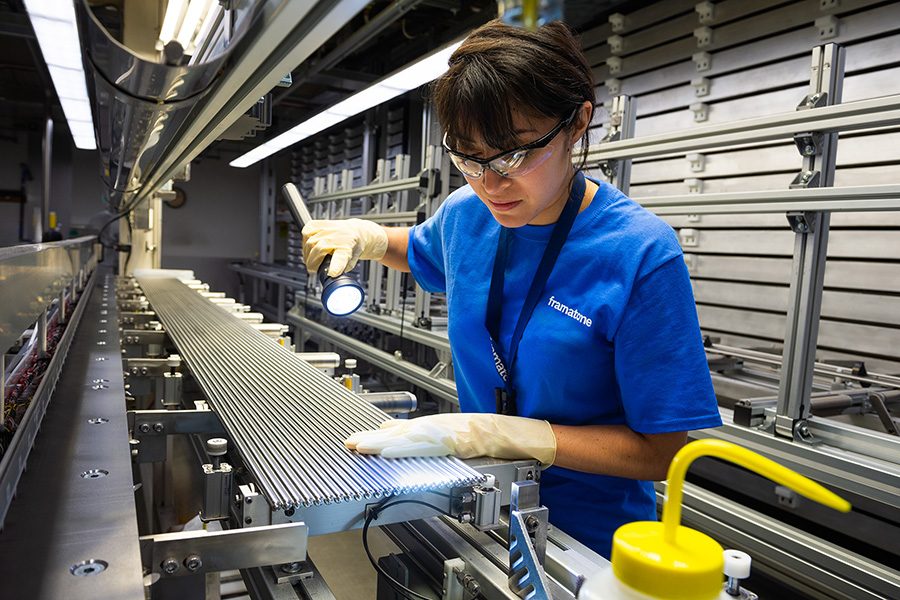
Home » Framatome enters recruitment mode with future expansion on horizon
Growth mode
Framatome enters recruitment mode with future expansion on horizon

An already tight supply of electricity nationally and globally combined with Framatome’s plan to double the size of its facility to produce the next generation of fuel arrays means the company is getting into recruitment mode. The company expects to hire 200 new workers once it can build and operate a planned new facility to produce HALEU fuel and it’s keeping its eyes focused on Tri-City prospects.
Courtesy FramatomeApril 14, 2025
Up until 2023, Richland’s Framatome was gradually cutting back its workforce.
More reactors were being shut down or having their construction canceled worldwide than were being brought online or remaining operational. A projected turnaround for the industry in the beginning of the 21st century evaporated after the three core meltdowns at the Fukushima nuclear power plant in Japan in the wake of a devastating earthquake and tsunami.
All that caused the France-based nuclear fuel producer’s Richland facility to drop from a peak payroll of about 1,000 in the 1990s to 580 today, not including contractors.
But that trend has reversed and will continue to.
Framatome has plans to double the size of its Richland facility, building it on an agricultural field it owns adjacent to the campus, to produce the next generation of fuel arrays to power nuclear reactors, a project estimated to cost $300 million to $400 million.
Lance Stephens, vice president of North America Fuel Manufacturing and Richland site manager, discussed the company’s plans with the Tri-Cities Area Journal of Business on a recent tour of the facility.
While undergoing a routine shutdown for maintenance at the time, signs of the plant’s activity were on display. Dozens of containers of uranium were waiting to be processed into fuel pellets that will eventually be inserted into fuel assemblies ahead of final inspections and transport to their destination reactors.
“There was a day recently that we had 13 trucks on the road going to four different plants,” he said. “It’s really remarkable to see all the electricity we’re contributing to.”
Framatome also plans to double the size of its Richland facility, building it on an agricultural field it owns adjacent to the campus, to produce the next generation of fuel arrays that will power nuclear reactors, a project estimated to cost $300 million to $400 million.
Recruitment mode
The already tight supply of electricity nationally and globally combined with its future expansion plans means the company is getting into recruitment mode and keeping its eyes focused on Tri-City prospects.
Framatome’s Richland facility originally opened in 1969 and has gone through several name changes as part of mergers and acquisitions but has operated under its existing name since 2018.
Running 24 hours a day, it produces 10 different types of fuel and a variety of arrays to fit different nuclear reactors, making the facility “reactor agnostic.”
The planned new facility would add to Framatome’s portfolio. It would produce high-assay low-enriched uranium, or HALEU, fuel. The fuel has a higher percentage of uranium than that currently produced at the Richland facility.
Last year, Framatome was one of six companies that received a 10-year contract from the U.S. Department of Energy to produce HALEU fuel. That contract – which specifically allows the companies to bid for work to deconvert HALEU as uranium hexafluoride gas to various chemical forms used to fabricate fuels required by many advanced reactor developers – will provide each producer a minimum of $2 million with up to $800 million available.
Stephens said further financial investment, either from DOE, its fuel customers or other investors, is still needed before the new facility can be built. There is no set timeline for the project.
HALEU is the fuel used in advanced nuclear power reactors, including small modular reactors, or SMRs. Those are the same kind of reactors Amazon has teamed up with Energy Northwest to develop and operate just north of the Tri-Cities.

Framatome is working toward building a new facility to produce high-assay low-enriched uranium, or HALEU, fuel, which is used in small modular reactors that are currently being planned for in the Mid-Columbia by Amazon and Energy Northwest. The company is looking for further financial investment before the new facility can be constructed at an estimated cost of $300 million to $400 million, in the green agricultural field shown in this aerial photo.
| Courtesy FramatomeDemand for energy
The development of advanced nuclear power reactors ties into the exponential growth in demand for energy. Proliferating data centers and artificial intelligence models require copious amounts of it.
The International Energy Agency (IEA) recently reported that global energy demand surged in 2024 to almost twice its recent average. And growing nuclear capacity was part of what allowed energy grids to meet that demand.
“The expanding supply of low-emissions sources covered most of the increase in global electricity demand in 2024,” the IEA reported. “The amount of new renewable power capacity installed worldwide rose to around 700 gigawatts, setting a new annual record for the 22nd consecutive year. Nuclear power capacity additions reached their fifth highest level in the past three decades.
“As a result, 80% of the increase in global electricity generation in 2024 was provided by renewable sources and nuclear, which together contributed 40% of total generation for the first time.”
Meanwhile, a global coalition of major companies including Amazon, Google and Meta, as well as nations, global banks and energy producers, recently pledged to triple the world’s nuclear capacity by 2050, according to a release from the World Nuclear Association.
“The global shift towards more nuclear highlights this is the only way we’ll deliver the abundant firm clean energy required to power growth and innovation in technology, a host of other industries and the entire economy,” said Sama Bilbao y Leon, director general of World Nuclear Association, in a statement.
Staff ramp up
Once completed, Framatome’s HALEU facility will require about 200 new salaried employees to operate.
“Over the past few years, it’s become very clear we need to ramp up,” Stephens said.
Though the company continues to recruit nationally at a number of colleges and universities, it has increased engagement and recruitment efforts locally in the past years as it tries to grow the Richland workforce.
The facility has a low attrition rate, and Stephens himself has been in Richland for 37 years. But those not from the region typically don’t stay long term, he said.
That led to a new strategy several years ago: Cultivate relationships closer to home. And that applies to prospective employees as well as with schools, such as Washington State University Tri-Cities and Columbia Basin College, so they can best prepare their students for the jobs Framatome offers.
And even without the new HALEU facility, Stephens said there’s still plenty of job security with Framatome’s current fuel production. The company has fuel contracts for the next six years and the Japanese nuclear energy market is reviving.
“The exciting thing is we’re putting equipment in related to advanced reactor fuels, we’re building prototypes, we’re not just on paper,” Stephens said of the work Framatome’s engineers are engaged in.
Local News Energy Manufacturing
KEYWORDS April 2025
Related Articles
Related Products





